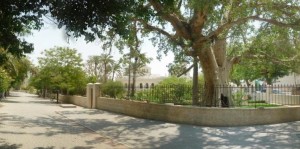As they heard these things, he proceeded to tell a parable, because he was near to Jerusalem, and because they supposed that the kingdom of God was to appear immediately. Luke 19:11
The disciples don’t share in the muttering about going to Zacchaeus’ house—they should eat so well every day. Comfortable sleeping quarters, too. And tomorrow, or the next day, or surely no more than three—Jerusalem! Passover is coming up—a perfect, propitious time for the kingdom to be proclaimed. Excitement is palpable among them, whether veteran or newbie. Jesus, who has been talking about money with Zacchaeus (not an evil thing, he says, in its place), suddenly looks over at them and brings them into the conversation.
“There was a man . . .”
The noise level in the hall drops at this familiar opening. They all know what’s coming next.
“. . . a nobleman, who was to be elevated as ruler of his country. Just before he left to receive his commission from the emperor, he called his ten most trusted servants and gave each of them one mina.”
Peter, James, and some of the originals wonder why he doesn’t say twelve instead of ten, so everyone would know who the trusted servants are.
“The master said, ‘I’m going to be away for some time. I can’t say how long. I want you to take those sums I’ve given to you and see what you can do with your share. We’ll add up accounts when I come back.’”
“So he departed to receive his crown, but the citizens of his country sent a delegation of protest to the Emperor saying, ‘We don’t want this man as our king.’”
A few of the more savvy followers glance at each and nod: the Jewish elders, scribes and Pharisees, obviously. But why did the nobleman have to go away to become king? Isn’t he right here?
“He was gone for a long time, but eventually came back in state, with all authority. And he called his servants to him. The first had increased his master’s money tenfold, and the king was well pleased. That servant received a commission to rule ten cities. Another had earned five minas from the one, so he received five cities. But a third came forward with no additional minas. His excuse was this: ‘Lord, here’s what you gave me; I kept it safe for you.’
“As the master’s face darkened, he blurted out, ‘I was afraid of you! You’re a hard man, sir; you ask too much of a poor, lowly slave. I’m not a gifted investor like the others, but I didn’t waste or spend it. Here’s what you gave me, safe and sound.’”
“’So I’m a hard man, am I? Is it ‘hard’ to entrust lowly slaves with rich blessings? Is it hard to want to elevate them, to lift them from slavery to sonship? Your own mouth condemns you. Here–” he said to the steward—“take the mina from this worthless slave and give it to the one with ten minas.”
“Wait!” Simon-called-Peter interrupted. “Do the servants get to keep the money? That guy already has a lot.”
“’I tell you,’ said the master (and the listeners weren’t sure whether Jesus was talking for himself or for the king in the story), ‘the one who has will be given more, and the one who doesn’t have will lose even the little he was given.”
“That hardly seems fair,” muttered some of the listeners.
“But what about those . . .” began John.
“’As for those enemies of mine, who did not want me to be king? Their punishment was a long time coming, but the day is finally here. Bring them here and execute them before me.’”
This is the last parable he would tell before entering Jerusalem. And it was almost the scariest.
_______________________________________________
For the original post in this series, go here.
Next>


 nother and another, belatedly realizing he’s left his stick behind. And his alms-box. Step after step, hands outstretched and fingers spread, he feels the crow both pulling back from and directing him, with a nudge here, a touch of the shoulder there. Until he finally comes to the glowing, living center.
nother and another, belatedly realizing he’s left his stick behind. And his alms-box. Step after step, hands outstretched and fingers spread, he feels the crow both pulling back from and directing him, with a nudge here, a touch of the shoulder there. Until he finally comes to the glowing, living center.